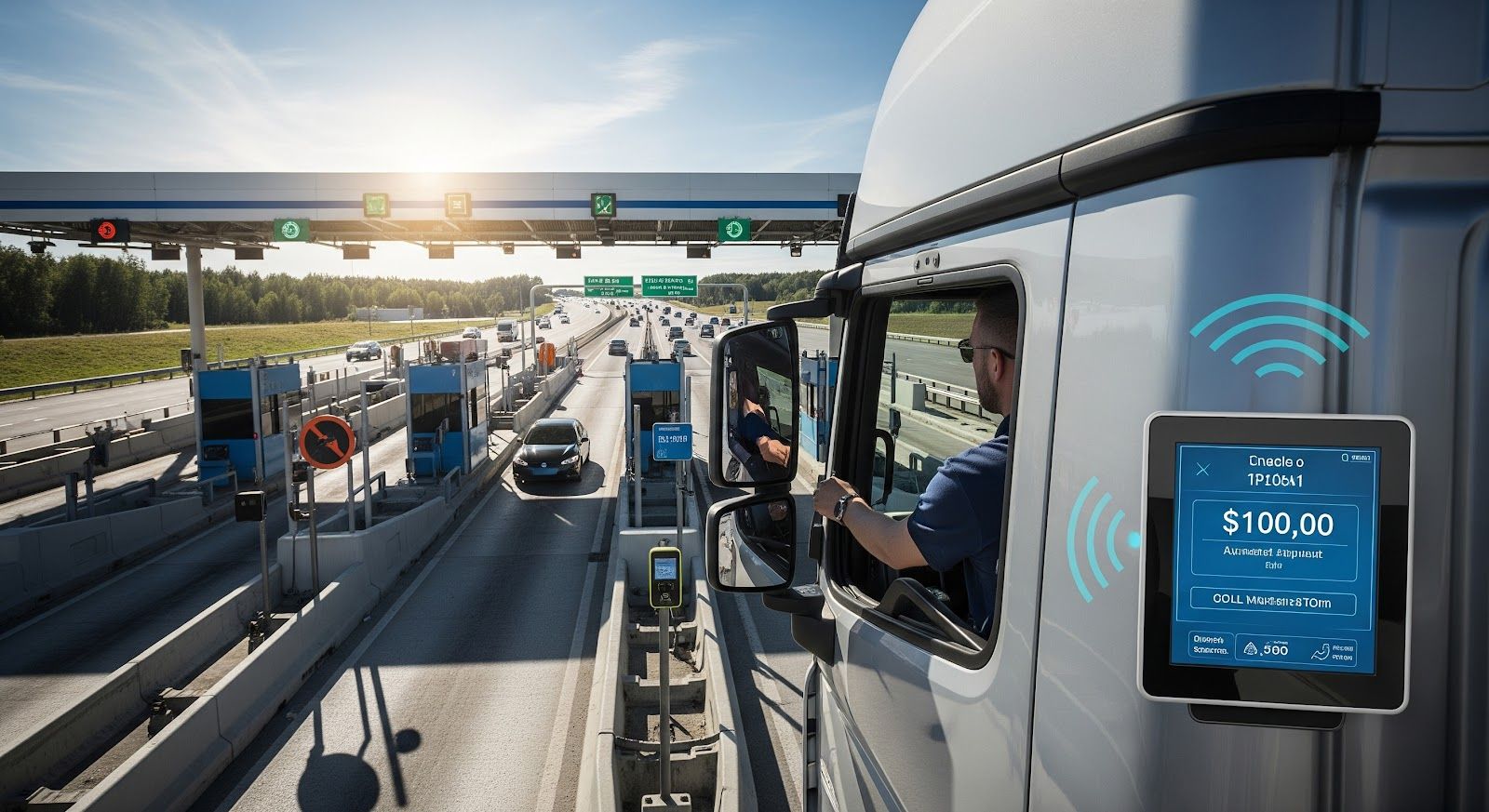Long Haul Trucking Compliance: Avoiding Toll Violations and Penalties

Long haul trucking is the backbone of the U.S. supply chain, moving goods across thousands of miles every day. But as essential as the industry is, long haul trucking comes with a unique set of challenges—especially when it comes to staying compliant with complex tolling systems across multiple states and jurisdictions.
For fleet operators and owner-operators alike, toll management is no longer a simple task of paying a few tolls here and there. Instead, it’s a high-stakes component of operations that can significantly affect the bottom line. Every toll road may have its own policies, technologies, and violation protocols, making compliance a moving target for fleets that travel across different regions.
Add in the variables of different vehicle classes, multiple transponders, changing license plate data, and toll-by-plate systems, and it becomes clear: staying compliant in long haul trucking isn’t just important—it’s essential for avoiding penalties, maintaining operational flow, and protecting profit margins.
In this article, we’ll explore the cost of non-compliance, why long haul fleets are especially vulnerable, and most importantly, how smart toll management solutions can help prevent violations and keep your operation moving forward.
The High Cost of Toll Violations
Toll violations might seem like a minor inconvenience at first glance, but for long haul trucking operations, they can escalate into serious financial and operational setbacks. Due to the vast distances covered, the number of toll roads encountered, and the varying tolling systems across states, long haul fleets face a higher risk of incurring violations than most.
Here are the most common types of toll violations long haul fleets encounter:
1. Missed Payments
Toll systems often operate on strict payment timelines. A delayed payment—even by a few days—can trigger violation notices that include fines and late fees. For fleets with dozens or hundreds of trucks on the road, even a small percentage of missed tolls can result in thousands of dollars in additional charges each month.
2. Transponder Misreads
Transponders are essential for smooth, automated toll payments. But if they're improperly mounted, malfunctioning, or not associated correctly with the vehicle in the toll system, they can lead to misreads. When this happens, the toll may default to a toll-by-plate charge, or worse, be considered unpaid—leading to violations and penalties.
3. Toll-by-Plate Issues
Toll-by-plate systems use cameras to capture license plates and match them to billing accounts. This method is vulnerable to errors, especially when license plate information is outdated, obscured, or not properly registered with the tolling authority. Misidentification can lead to missed bills or duplicate charges, both of which are costly and time-consuming to resolve.
4. Outdated Vehicle or License Plate Data
Keeping fleet vehicle and plate data current is critical for toll compliance. Toll systems depend on this information to assign charges accurately. If a truck has changed plates or been reassigned and that update hasn’t been reflected in the tolling account, it may trigger violations, surcharges, or even collection efforts.
Why Long Haul Fleets Struggle with Compliance
Staying toll-compliant in long haul trucking isn't just about paying bills on time—it’s about navigating a fragmented, constantly changing tolling landscape across the country. For fleets operating across state lines, the complexity of compliance can become a full-time challenge. Here’s why many long haul fleets find themselves struggling:
1. Diverse Tolling Systems Across States
The United States does not have a single, unified tolling system. Instead, fleets must contend with dozens of different tolling agencies, each with its own technologies, billing rules, and enforcement practices. A route from New Jersey to California may cross through more than a dozen toll authorities—each requiring specific transponders or payment methods.
This patchwork of systems makes it difficult for fleets to remain consistently compliant. What works for E-ZPass in the Northeast might not apply to systems in Texas, California, or Florida. Without a comprehensive tolling solution, this creates constant risk for violations and administrative confusion.
2. Lack of Centralized Toll Management
Many long haul fleets still rely on multiple toll accounts or regional toll solutions, leading to siloed data and disjointed billing processes. Without centralized toll management, fleet managers must manually reconcile toll charges across different systems and timeframes—an inefficient and error-prone process.
This decentralization not only increases the risk of missed payments and violations, but it also makes it nearly impossible to track toll spend accurately across the fleet, identify trends, or optimize routes based on cost.
3. Limited Visibility Into Real-Time Toll Activity
When toll transactions are delayed or obscured by backlogged systems, fleet operators have little to no visibility into toll charges as they occur. This delay makes it difficult to detect and respond to errors in real-time—such as a misread transponder or a driver taking a non-approved toll route.
Without access to real-time toll activity, violations can go unnoticed until penalties have already been assessed, leaving little room for proactive correction.
4. Manual Processes and Paperwork Overload
In fleets that lack automation, managing toll compliance often falls on overburdened administrative teams. Staff may be responsible for sorting through stacks of toll invoices, validating charges, resolving disputes, and tracking down payment confirmations.
This manual toll management process not only drains time and resources but also increases the likelihood of human error. In a high-volume, multi-state operation, even small oversights can lead to repeated violations and unnecessary expenses.
5. Frequent Equipment Issues (Lost/Damaged Transponders)
Transponders are the frontline of toll compliance—but they’re also vulnerable to damage, improper installation, or simply getting lost. A misaligned transponder may not register correctly at toll points, leading to toll-by-plate fallback charges or outright violations.
Furthermore, if a driver doesn’t report the issue promptly, the fleet may incur weeks of penalty-laden tolls before it’s caught. This makes tracking and maintaining transponder inventory an essential, yet often overlooked, part of fleet compliance.
In short, long haul fleets face a perfect storm of operational complexity, technological fragmentation, and administrative burden when it comes to toll compliance. Without the right tools and processes in place, violations are not a matter of if—but when. That’s where centralized, automated toll management platforms like Bestpass can make a measurable difference.
Best Practices for Toll Compliance
Maintaining toll compliance for a long haul fleet requires a proactive approach grounded in accuracy, automation, and visibility. With tolling systems becoming more sophisticated—and enforcement becoming more aggressive—fleets need to adopt best practices that minimize violations and streamline operations. Here are the most effective strategies:
1. Keep Vehicle and License Plate Data Up to Date
Accurate vehicle and license plate information is foundational to toll compliance. Tolling agencies rely on plate data to verify toll-by-plate transactions and match charges to the correct accounts. Outdated or incorrect data can result in misapplied charges, missed payments, or duplicate violations.
Best practice: Set a process to update your toll account immediately whenever:
- A vehicle is added, removed, or reassigned.
- A license plate is changed or replaced.
- A vehicle is transferred across regions or business units.
Fleet management systems should be integrated with toll platforms to ensure seamless updates without manual entry errors.
2. Use Centralized Toll Management Systems
Managing tolls through multiple regional accounts is inefficient and risky. Centralized toll management consolidates all toll transactions across the U.S. into a single account and dashboard, making compliance easier and more transparent.
Benefits include:
- Unified billing and simplified reconciliation.
- Reduced administrative time and fewer payment errors.
- Improved visibility across all fleet toll activity—regardless of region.
Bestpass, for example, provides national toll coverage through a single solution, eliminating the need to juggle accounts across different states or agencies.
3. Implement Automated Toll Processing and Reporting Tools
Manual toll processing is slow, error-prone, and unscalable—especially for fleets operating thousands of miles each week. Automation ensures that toll payments are processed on time, violations are flagged instantly, and reports are generated without human intervention.
Key automation features:
- Real-time toll transaction logging and alerts.
- Automatic detection and correction of misreads.
- Scheduled reports for expense tracking, audits, and cost analysis.
This automation not only keeps you compliant but also provides powerful business intelligence to optimize operations.
4. Educate Drivers on Proper Transponder Use and Positioning
A misaligned or improperly mounted transponder is one of the most common causes of toll misreads. Drivers play a critical role in ensuring compliance by using equipment correctly.
Driver training should include:
- Where to install or place the transponder inside the vehicle.
- How to recognize warning signs of a malfunctioning unit.
- What to do if a transponder is lost, damaged, or stolen.
- Awareness of toll road policies in different regions.
Empowered drivers can reduce violations and save fleets from unnecessary fees or delays.
5. Monitor Toll Transactions Regularly to Identify Issues Early
Even with automation in place, regular monitoring is essential. Routine audits of toll activity can help you:
- Catch and dispute erroneous charges early.
- Detect patterns in violations (e.g., specific routes or drivers).
- Assess route cost-efficiency based on real toll data.
Using a toll management dashboard, fleet managers can view real-time and historical data to continuously improve compliance and avoid costly surprises.
By implementing these best practices, long haul fleets can stay ahead of toll compliance challenges, protect their bottom line, and reduce the administrative burden on back-office teams. In a high-volume, multi-state operation, these small steps can lead to substantial savings and smoother operations.
The Role of Toll Management Solutions Like Bestpass
Long haul trucking fleets face significant toll compliance challenges—but with the right tools, these challenges can be managed, minimized, or eliminated entirely. This is where toll management solutions like Bestpass become indispensable. Designed specifically for commercial and long haul fleets, Bestpass provides a powerful, unified platform to streamline toll payments, reduce violations, and improve visibility across every mile of your operation.
Here’s how Bestpass helps long haul fleets stay compliant and cost-effective:
1. Real-Time Toll Data and Alerts
Bestpass provides fleets with immediate access to toll transaction data as it happens. This real-time visibility allows fleet managers to monitor toll activity across their entire fleet, identify anomalies quickly, and take corrective action before issues escalate into violations.
Use case: If a vehicle is charged unexpectedly on a route it shouldn’t be taking, fleet managers receive alerts and can intervene immediately—saving time, money, and potential penalties.
2. Transponder Backup with Toll-by-Plate Capture
Even when a transponder is lost, damaged, or misread, Bestpass reduces the risk of a violation through its toll-by-plate backup system. The system captures toll transactions based on license plate data, ensuring the charge is still processed—even without a working transponder.
This dual-layer protection greatly reduces the number of missed tolls and violations that can occur due to equipment failure or driver error. It also ensures continuity of toll payments, especially in regions where plate-based billing is the fallback method.
3. Automatic Payments Across All Major Toll Roads
Bestpass consolidates toll billing across more than 50 tolling authorities in the U.S., providing seamless toll coverage from coast to coast. Instead of managing dozens of regional accounts and payment schedules, fleets get one consolidated invoice and automated payments that eliminate the risk of late fees or missed bills.
This is particularly beneficial for long haul fleets moving across multiple toll zones in a single trip. Whether you’re running loads through E-ZPass states, Texas, California, or Florida, Bestpass ensures every toll is processed and paid on time.
4. Misread Detection and Correction
Toll misreads—often caused by dirty license plates, camera errors, or transponder misalignment—are a leading cause of violations. Bestpass actively identifies potential misreads and works with tolling authorities to correct them before a violation is issued.
Through its proprietary systems and direct relationships with toll authorities, Bestpass helps ensure that toll classifications are accurate and fair, protecting fleets from overcharges and unnecessary fines.
Bestpass provides the visibility, automation, and support that long haul fleets need to remain compliant, avoid costly violations, and optimize their toll spend. By transforming a traditionally manual and fragmented process into a streamlined, data-driven operation, Bestpass empowers fleets to focus on what matters most: delivering freight on time and on budget.
Ready to Master Toll Compliance and Protect Your Fleet's Bottom Line?
Simplify toll management with Bestpass—the comprehensive platform that consolidates nationwide toll coverage into one centralized account. Contact Bestpass today to discover how easy compliant, cost-effective long haul trucking can be.

